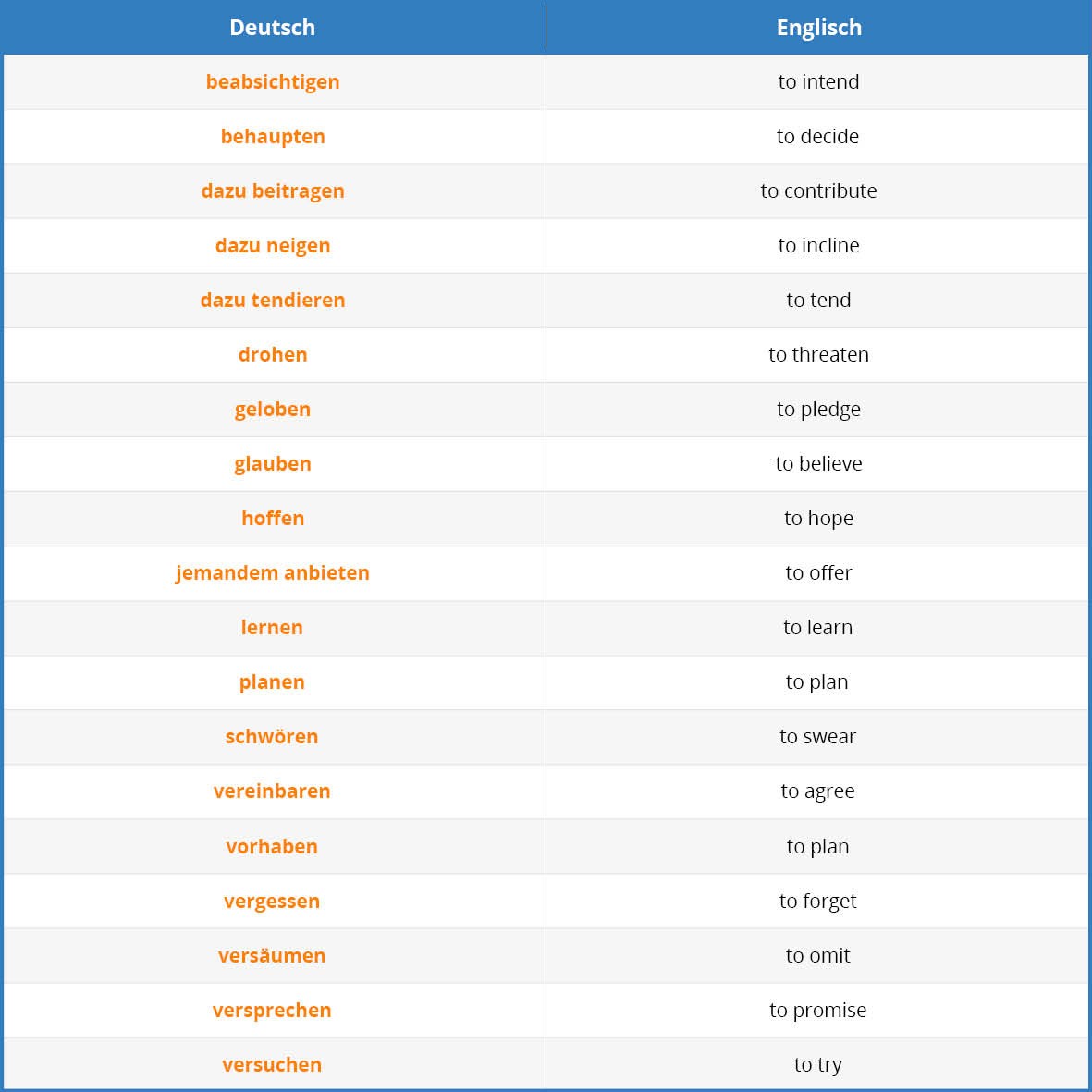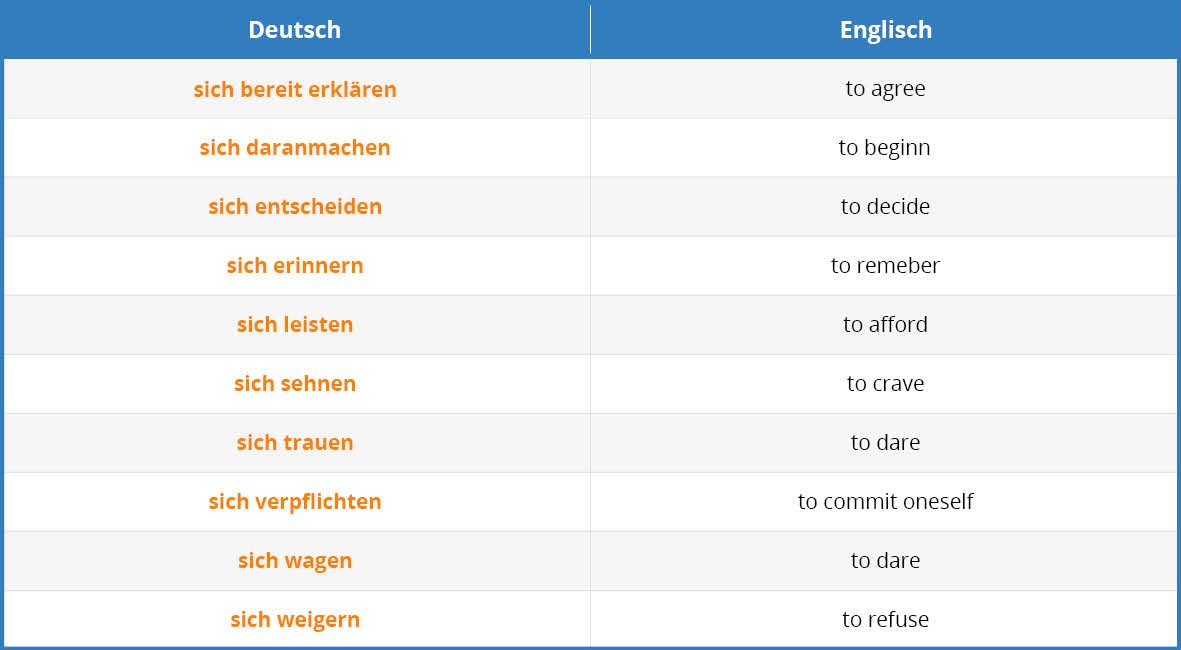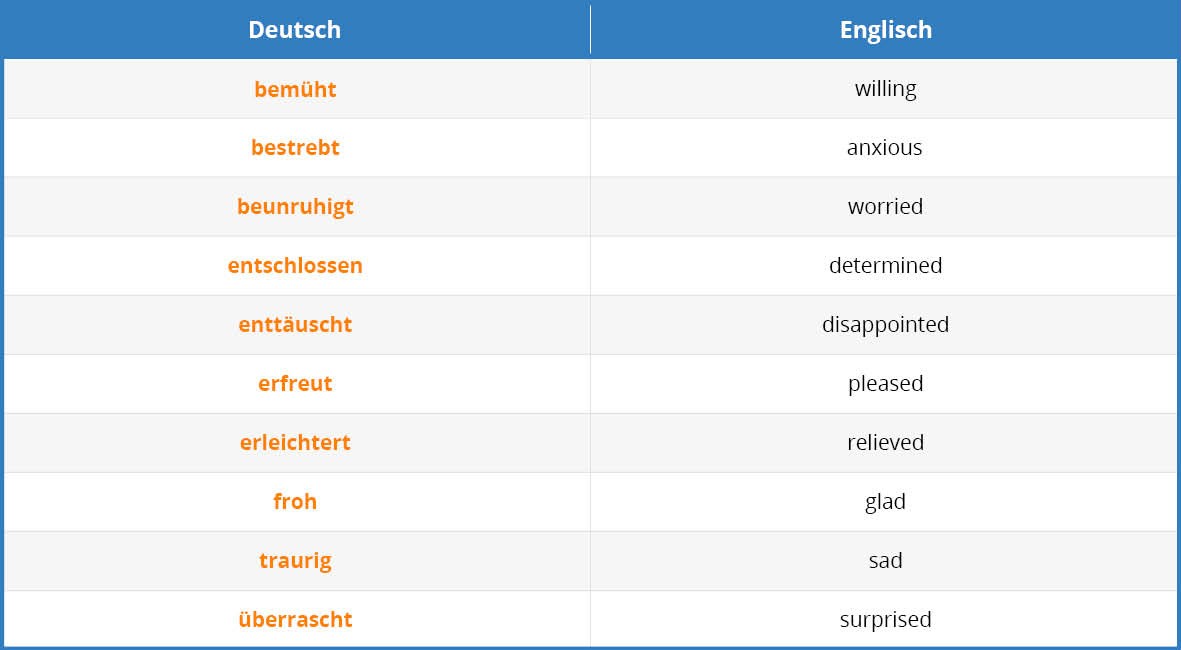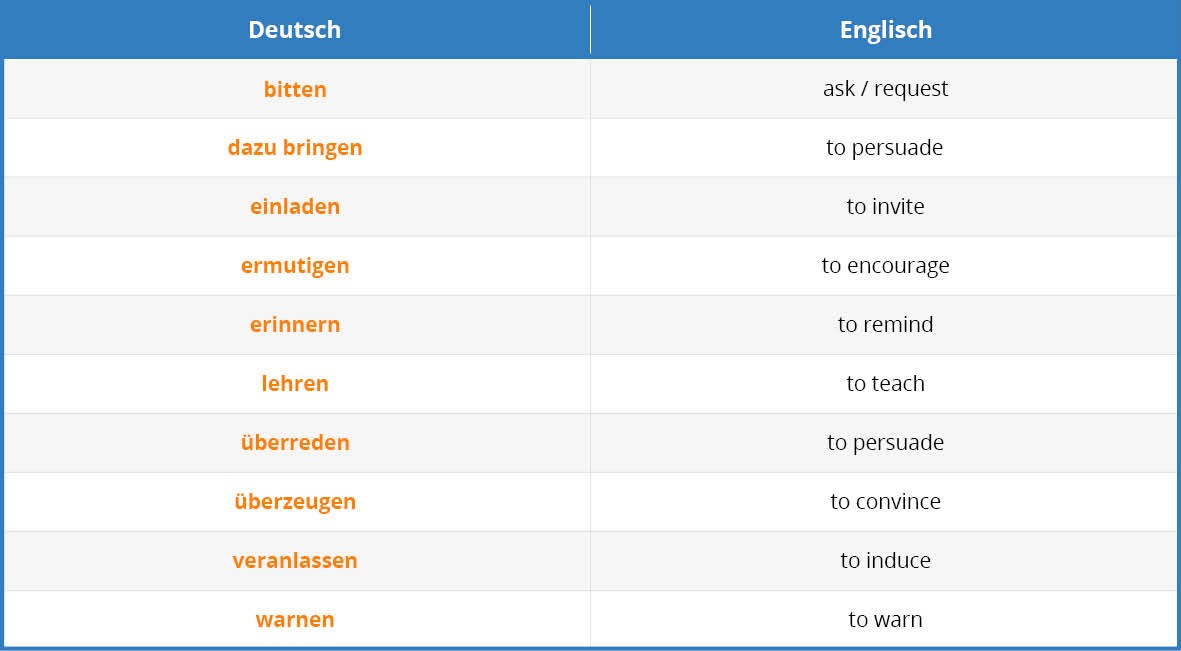German Infinitive Clauses
Infinitivsätze im Deutschen – Erklärungen und Beispiele
German Infinitive Clauses – Summary
Zusammenfassung
In German, most of the verbs have the ending “-en” (lachen, laufen, machen, …). The basic form of a verb, so, their not conjugated form, is called “infinitive” (“Infinitiv“). In a dictionary, you will always find the verbs in the infinitive form. In some cases you can also find the infinitive form of a verb in sentences. This often occurs when there are two verbs in the sentence. As a form verb in the sentence, the infinitive can be found with or without “zu“.

Sentences are called infinitive clauses, when the infinitive is built with “zu”.
The German infinitive! Well, finally a part in German grammar which is easy and understandable you might think. Of course, the infinitive forms of German verbs are not too complicated. But there is a grammatical construction, where the German infinitive plays a more difficult role: The German infinitive clauses.
Don’t worry, in the following we will try to clear up everything about this grammatical topic. Apart from that you should understand the high significance of this type of subordinate clauses. Well, they simply allow you to express yourself in a much more complex way.
So, in the following, we will clear up what this type of German subordinate clause actually is. Furthermore, we will talk about its correct usage and the word order you apply in these sentences. Finally, we will have a detailed look on words and phrases that introduce this subordinate clause. Auf geht’s!
The Description and Usage of German Infinitive Clauses
Die Beschreibung und Anwendung von Infinitivsätzen im Deutschen
So, let’s come to the first point of this article and clear up what German infinitive clauses actually are. Take a look at the following description.
German infinitive clauses are subordinate sentences which are constructed with the infinitive form of a verb and the preposition “zu”.
Well, especially German infinitive clauses with the expression “um zu” represent the purpose of an action. Furthermore, there are certain phrases and verbs that introduce this type of subordinate clause. Of course, we will have a closer look on some lists of these expressions in the following. Now, let’s come to the correct usage of German infinitive clauses.
The Correct Usage of German Infinitive Clauses
Well, in order to use this type of German subordinate clause in the correct way, I’d like to list up the most important points and give an example for every one.
- First, infinitive clauses can be used after certain words and phrases.
“Er erlaubt ihr nicht, das Auto zu fahren.” – He doesn’t allow her to drive the car. - Second, you should keep in mind that an infinitive clause normally follows a main sentence. But, in rare cases, it can also occur at the beginning of the main clause.
“Ein intelligenter Mensch zu sein, ist nicht einfach.” – Being an intelligent human is not easy. - Third, German infinitive clauses usually refer to the subject of the main sentence.
“Sie muss erst lernen, Auto zu fahren.” – She still has to learn to drive the car.
Unfortunately it’s not that easy: Sometimes, German infinitive clauses refer to the object with certain verbs and phrases.
“Er empfiehlt Ihnen, mehr zu lernen.” – I advise you to study harder. - Finally, we use the term “um zu” to express the goal or the purpose of an action. Here, the German infinitive clause refers to the subject.
“Er hat so viel gelernt, um die Führerscheinprüfung zu bestehen.” -He has studied very hard to pass the drivers license exam.
So, I hope that the usage of this type of subordinate clause became clear. Now, let’s come to the word order in German infinitive clauses.
The Word Order of German Infinitive Clauses
Der Satzbau von Infinitivsätzen im Deutschen
Well, let’s come straight to the point. So, in order to construct German infinitive clauses, you can use the word “zu” with infinitive forms of the verb. You simply put these words at the end of the clause.
- “Ich kann bald Deutsch sprechen!” – “Ich hoffe, bald Deutsch sprechen zu können!”
- “Nicht viele Leute sprechen Deutsch.” – “Deutsch zu sprechen, ist sehr selten.”
As already mentioned above, the “um” of the expression “um zu” is placed at the beginning of the German infinitive clause.
- “Ich bin hier, um Deutsch zu lernen”
By the way, in the case of German separable verbs, “zu” is placed between the two parts of the verb.
- “verbeigehen” – “vorbeizugehen”
- “anziehen” – “anzuziehen”
Well, I think that we have passed the most complicated parts of this article. By now, you should know the rules about German infinitive clauses. So, as promised, let’s list some verbs that introduce an infinitive clause in German.
Lists of Verbs and Phrases
Listen von Verben und Phrasen
Finally, we will have a look at lists of verbs and phrases after which the German infinitive clause is normally used. Well, you will see that the infinitive clause can refer to the subject, the object or it can be an impersonal phrase.
1. Infinitive Clauses referring to the Subject
- “Philip behauptet, diese Frau zu kennen.”

2. Reflexive Verbs that Require Infinitive Clauses
- “Philip hat sich entschieden, Soziologie zu studieren.”

3. Adjectives that require Infinitive Clauses
- “Philip ist bestrebt, Deutsch zu lernen.”

4. List of Noun Phrases that Require Infinitive Clauses
- “Philip hat die Absicht, Deutsch zu lernen.”

5. Infinitive Clauses Referring to the Object
List of Accusative Verbs that Require Infinitive Clauses
- “Philip bringt den Hund dazu, zu sitzen.”

List of Dative Verbs that Require Infinitive Clauses
- “Language-easy.org möchte mir beibringen, Deutsch zu sprechen.”

Infinitive Clauses Referring to an Impersonal Form
Here, we generally use the following adjectives with the impersonal form “es” (in the sense of one).
-
- “Es ist nahezu
unmöglich
-
- , perfektes Deutsch zu sprechen.”
“Man kann kein perfektes Deutsch sprechen.”

Exercises
Übungen
Finally, we have reached the last part of this article where you can prove the German skills you have just learned. In the following you will see some phrases that you should complete with the correct terms. Once you have filled all the gaps, just click on the “correct” button and you can see your errors and the correct results. Good luck and… auf Wiedersehen!



